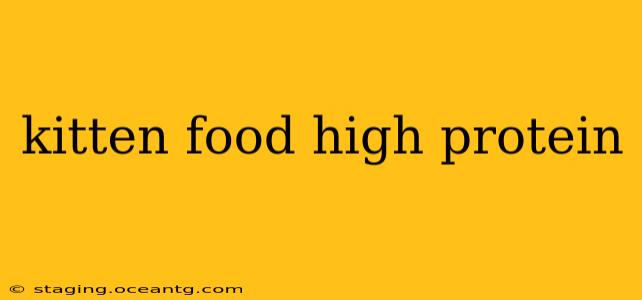Choosing the right kitten food is crucial for their healthy development. Protein is a cornerstone of a kitten's diet, fueling their rapid growth and ensuring strong muscles and a healthy immune system. This guide explores the importance of high-protein kitten food, helping you select the best option for your furry friend.
Why is High Protein Important for Kittens?
Kittens have incredibly high protein requirements compared to adult cats. Their bodies are constantly building new tissues, muscles, and organs, demanding a significant protein intake. A protein deficiency can lead to stunted growth, weakened immunity, and other serious health problems. High-protein kitten food ensures they receive the building blocks necessary for robust development. Look for foods that clearly state the protein source and percentage on the label.
What are the Best Protein Sources for Kittens?
Not all protein sources are created equal. While many foods boast high protein content, the quality and digestibility of the protein matter significantly. Here are some excellent protein sources to look for in high-protein kitten food:
- Chicken: A classic and highly digestible protein source, readily accepted by most kittens.
- Turkey: Another excellent choice, often hypoallergenic and easily digestible.
- Fish (e.g., Salmon, Tuna): Provides essential fatty acids alongside protein, beneficial for coat health and brain development. However, always ensure it's specifically formulated for cats and is free from harmful contaminants.
- Lamb: A good option for kittens with sensitivities to chicken or beef.
- Rabbit: A lean protein source that is easily digestible.
Avoid foods with unspecified "meat by-products" as these lack transparency regarding their composition and may contain lower-quality ingredients.
How Much Protein Does a Kitten Need?
The exact protein requirement varies depending on the kitten's age, breed, activity level, and overall health. However, as a general guideline, kitten food should contain a minimum of 30% protein on a dry matter basis (this is usually indicated on the packaging). Always check the nutritional information on the food label and consult your veterinarian for personalized recommendations based on your kitten's specific needs.
What to Look For in High-Protein Kitten Food:
Beyond the protein content, consider these factors when selecting high-protein kitten food:
- Ingredient List: The first few ingredients should be high-quality animal proteins, not fillers like grains.
- Fat Content: Kittens need fat for energy and brain development, but ensure it's balanced with the protein.
- Fiber: A moderate amount of fiber aids digestion.
- Vitamins and Minerals: Ensure the food is fortified with essential nutrients for complete nutrition.
- Age Appropriateness: Choose food specifically formulated for kittens, not adult cats.
What if My Kitten is Allergic to Certain Proteins?
Some kittens may have sensitivities to certain protein sources. If your kitten shows signs of allergies (such as skin irritation, digestive upset, or vomiting), consult your veterinarian immediately. They can perform allergy testing and recommend a suitable hypoallergenic diet. Often, novel protein sources like venison or duck are used in hypoallergenic kitten foods.
Can I Supplement My Kitten's Food with Extra Protein?
While high-protein kitten food is designed to meet their nutritional needs, it’s crucial not to supplement without veterinary advice. Over-supplementation of protein can lead to health issues. Always discuss any dietary changes or supplements with your veterinarian to ensure your kitten receives the right balance of nutrients.
How Do I Transition My Kitten to High-Protein Food?
Introduce new food gradually over 7-10 days. Start by mixing a small amount of the new food with their current food, progressively increasing the proportion of the new food each day. This prevents digestive upset.
By carefully considering the factors discussed above, you can select a high-protein kitten food that fuels your kitten's healthy growth and development, setting them on the path to a long and happy life. Remember to always consult your veterinarian for personalized advice tailored to your kitten's specific needs.
